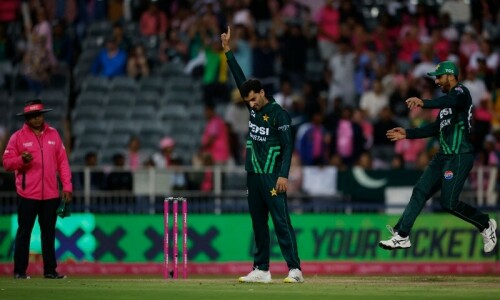With barely eight months to go before the sixth edition of the ICC World Twenty20 starts in India next spring, the main title-contenders are in the process of team-building for the biannual event.
Pakistan, the 2009 champions and the runners-up of the inaugural championship two years earlier, are among the major contenders despite being currently ranked behind Sri Lanka (135 rating points), Australia (122), India (118) and the West Indies (117).
The green-shirts can improve their current position (114 rating points) if they succeed in winning the Twenty20 Internationals against Sri Lanka next week. With a possible six further such games after the double-header at the R. Premadasa Stadium in the Sri Lankan capital, Pakistan will surely appreciate the opportunities coming their way to gear up for the global tournament.
At the same time, all the stake-holders (the selectors, the team’s think tank as well the cricket board) have to devise a strategy to come up with a formidable group of players when Pakistan travel across the border to erase bitter memories of last year’s abject show in Bangladesh where the Mohammad Hafeez-led team even failed to make the semi-finals.
Chief selector Haroon Rashid claims in Pakistan Cricket Board (PCB) media release that the selection for the Sri Lanka T20 matches was straight forward. On the contrary, it was far from it. Sohail Tanvir and Umar Akmal, in fact, should consider themselves extremely fortunate that their connections within the ranks have yet again saved them from being unceremoniously axed.
The youngest of the three Akmal siblings who have played for the country has often dared to defy the authorities, including the PCB. He refused to turn up for fitness tests since he considered the Caribbean Premier League more prestigious and lucrative than obeying his employers back home.
Umar, let us all shouldn’t forget, was mentioned by Waqar Younis in his post-World Cup report to the board as a player who needed to be strictly disciplined if he wanted to prolong his stay in international cricket. But instead, he has chosen to flout rules and regulations time and again, so much so that cynics have no hesitation in saying that Umar is the enfant terrible of Pakistan cricket.
Even his father-in-law Abdul Qadir, the legendary leg-spinner of the 1970s and 80s, has expressed in the media his displeasure at Umar’s irresponsible attitude both as a cricketer as well as a Lahore citizen since the young man has also been found breaking traffic rules in his hometown where he was fined for over-speeding.
But the bottom line is that Umar is back in Pakistan squad; despite his attitude, despite an ordinary domestic season, despite half a dozen deserving players waiting in the wings.
A known critic appropriately commented on the recently named T20 squad when he said: “The day Afridi leaves cricket, Pakistan will start winning again. His consistent selection of bits and pieces cricketers and preference of boom bust players has hurt Pakistan a lot.”
This view is absolutely spot on because on merit — and the majority will tend to agree — Afridi no longer commands a regular place in the national T20 team. His appointment last September as captain until the 2016 World Cup was viewed as one of the wacky decisions taken by the PCB.
According to a report carried by Dawn the very day the once flamboyant all-rounder was contentiously handed the reins to succeed Mohammad Hafeez, the PCB was under severe pressure from influential circles within the board to hand the mantle to Afridi. The fact is that the official announcement to appoint the all-rounder as skipper came as a big surprise for many in the country.
This also explains why the selectors repeatedly save their own skins by eschewing the media at the time of unveiling the Pakistan squads for different formats because they are either in no position or refrained by the PCB to justify debatable selections. A prime reason of this mentality is that the selectors are bound to respect the views of the stake-holders who invariably have an influential role to play when the teams are picked.
Over the years, powerful individuals have ruled the roost in Pakistan cricket. The domineering Imran Khan during his successful captaincy tenure in the last century had scant respect for the selectors, or even the board officials, whom he seldom trusted and used to choose players he felt were necessary for the national side.
The dictatorial mindset took a back seat in the post-Imran years despite some of the modern-day captains trying to act in the same way without much luck. But the culture of favouritism have never left Pakistan cricket. Some of the subsequent skippers wrangled with the authorities if selections were not to their liking.
Afridi does use his clout and influence in selection matters and preference for under-performing Umar and Sohail points to the fact that as long as he leads, he would interfere to get the men of his choice.
The current selectors, it appears, have become stooges in the face of pressure exerted by strong-headed characters within the ranks at a time when experimentations in bilateral series are mandatory before the world event.
One may tend to feel for the various selection committees, but there have been rare instances in the past where the selectors have acted independently. The committee headed by Salahuddin Ahmed in the post-2007 World Cup era did a fabulous job and more than once had the courage to corner both the captain (Shoaib Malik) and head coach (Geoff Lawson) when they attempted to poke their noses in selection matters simply because then merit was order of the day.
As the chief selector, Haroon must own up the decisions taken by his four-man committee. Credit, therefore, should be given where it is due because Pakistan have performed beyond expectations on their current tour of Sri Lanka by ending a nine-year period of deep depression both at the Test and ODI levels. By winning the T20 rubber, Pakistan will achieve an unprecedented treble against a country which is ranked above them in two of the three forms of International cricket.
Published in Dawn, July 26th, 2015
On a mobile phone? Get the Dawn Mobile App: Apple Store | Google Play














































